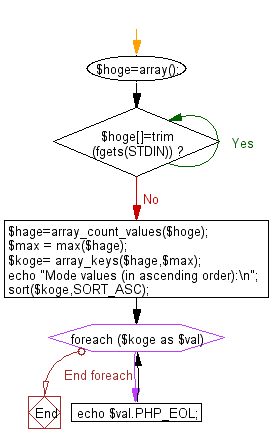PHP Exercises: Print mode values from a given a sequence of integers
PHP: Exercise-60 with Solution
Write a PHP program to print mode values from a given a sequence of integers. The mode value is the element which occurs most frequently. If there are several mode values, print them in ascending order.
Input:A sequence of integer’s ai (1 ≤ ai ≤ 100). The number of integers is less than or equals to 100.
Sample Solution: -
PHP Code:
<?php
$hoge=array();
while($hoge[]=trim(fgets(STDIN))){}
$hage=array_count_values($hoge);
$max = max($hage);
$koge= array_keys($hage,$max);
echo "Mode values (in ascending order):\n";
sort($koge,SORT_ASC);
foreach ($koge as $val) {
echo $val.PHP_EOL;
}
?>
Sample Input:
6
7
4
6
9
8
6
4
10
8
4
5
Sample Output:
Mode values (in ascending order): 4 6
Flowchart:

PHP Code Editor:
Have another way to solve this solution? Contribute your code (and comments) through Disqus.
Previous: Write a PHP program to that reads a date (from 2004/1/1 to 2004/12/31) and prints the day of the date. Jan. 1, 2004, is Friday. Note that 2004 is a leap year.
Two integers m and d separated by a single space in a line, m ,d represent the month and the day.
Next: Write a PHP program which reads a text (only alphabetical characters and spaces.) and prints two words. The first one is the word which is arise most frequently in the text. The second one is the word which has the maximum number of letters.
What is the difficulty level of this exercise?
Test your Programming skills with w3resource's quiz.
PHP: Tips of the Day
How to Sort Multi-dimensional Array by Value?
Try a usort, If you are still on PHP 5.2 or earlier, you'll have to define a sorting function first:
Example:
function sortByOrder($a, $b) {
return $a['order'] - $b['order'];
}
usort($myArray, 'sortByOrder');
Starting in PHP 5.3, you can use an anonymous function:
usort($myArray, function($a, $b) {
return $a['order'] - $b['order'];
});
And finally with PHP 7 you can use the spaceship operator:
usort($myArray, function($a, $b) {
return $a['order'] <=> $b['order'];
});
To extend this to multi-dimensional sorting, reference the second/third sorting elements if the first is zero - best explained below. You can also use this for sorting on sub-elements.
usort($myArray, function($a, $b) {
$retval = $a['order'] <=> $b['order'];
if ($retval == 0) {
$retval = $a['suborder'] <=> $b['suborder'];
if ($retval == 0) {
$retval = $a['details']['subsuborder'] <=> $b['details']['subsuborder'];
}
}
return $retval;
});
If you need to retain key associations, use uasort() - see comparison of array sorting functions in the manual
Ref : https://bit.ly/3i77vCC
- New Content published on w3resource:
- HTML-CSS Practical: Exercises, Practice, Solution
- Java Regular Expression: Exercises, Practice, Solution
- Scala Programming Exercises, Practice, Solution
- Python Itertools exercises
- Python Numpy exercises
- Python GeoPy Package exercises
- Python Pandas exercises
- Python nltk exercises
- Python BeautifulSoup exercises
- Form Template
- Composer - PHP Package Manager
- PHPUnit - PHP Testing
- Laravel - PHP Framework
- Angular - JavaScript Framework
- Vue - JavaScript Framework
- Jest - JavaScript Testing Framework
